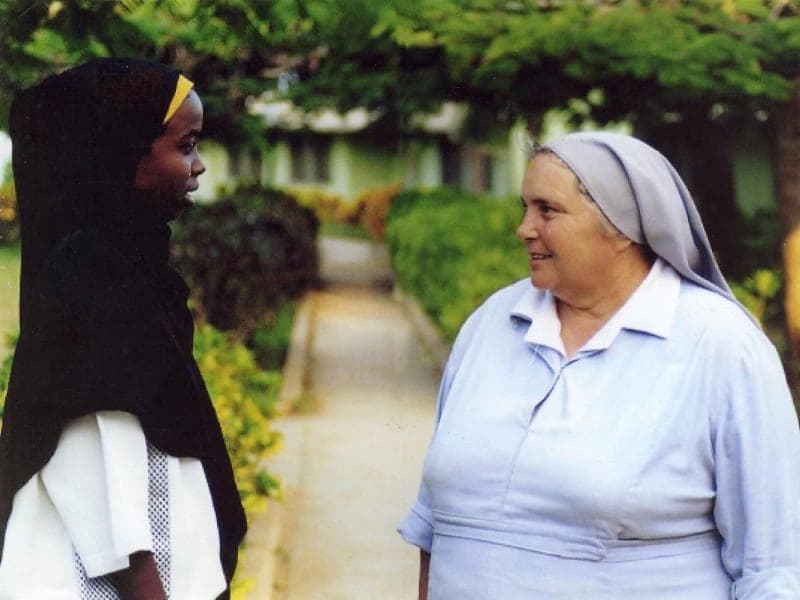ROME— Undoubtedly, the best-known sainthood cause Pope Francis advanced this week is that of Pope John Paul I, the “Smiling Pope” of 33 days. But not to be overlooked is the cause of an Italian nun murdered in hatred of the faith in Somalia, allegedly killed during the uproar within the Muslim world following a speech by Benedict XVI.
Sister Leonella Sgorbati, a Consolata Missionary Sister, and her bodyguard, a Muslim named Mohamed Osman Mahamud, where shot on Sept. 17, 2006, in Mogadishu. She was rushed to a hospital, but died soon after as a result to her wounds. She had spent her religious life working in Africa, mostly in Kenya.
“I forgive, I forgive, I forgive,” were her last words, whispered to Marzia Feurra, another sister of her congregation.
Francis’s ruling, which took place on Wednesday but was announced by the Vatican on Thursday, declared her a martyr, meaning that it’s been recognized that she was murdered in odium fidei, in hatred of the faith.
In 2001, Sgorbati spent a few months in the Somali capital because she wanted to open a nursing school in the hospital run by the organization SOS Children’s Village. She managed to open the school in 2002, and when the first students were ready, she took three to Kenya to help enroll them in a local university.
She had trouble returning to Somalia, but was eventually allowed to do so on Sept. 13, 2006, just days before being murdered. Sgorbati and her body guard were ambushed by two men who’d been hiding behind vehicles and kiosks.
When the first shot hit her thigh, the body guard responded and shielded her with his body. He died at the scene, while she was rushed to the hospital the two were already headed to. However, her wounds were too severe: she’d been hit seven times.
At the time, Sgorbati was one of only two Westerners left in Mogadishu because the city was in the grip of Islamic militants.
Born Rosa Maria Sgorbati in Italy back in 1940, she studied nursing and spend a decade in formation before taking her perpetual vows.
To this day, the motive of her murder remains unknown. However, it came two days after hardline Somali cleric Sheikh Abubakar Hassan Malin had told worshippers at his mosque to hunt down and kill whoever offended the Prophet Mohammed.
The cleric’s call was a direct response to a speech that then-Pope Benedict XVI had delivered in Ratisbona, Germany, the previous Tuesday. The German pontiff gave a 40-minute academic lecture at the University of Regensburg on the relationship between reason and faith.
In his remarks, Benedict insisted that religion and reason need one another, and included a plea against religious violence. However, he opened the speech with a reference to a 14th century dialogue between the Byzantine emperor Michael II Paleologus and a “learned Persian,” in which the emperor criticizes Islam.
The quote that caused the furor followed: “He turns to his interlocutor somewhat brusquely with the central question on the relationship between religion and violence in general, in these words: ‘Show me just what Mohammed brought that was new, and there you will find things only evil and inhuman, such as his command to spread by the sword the faith he preached,'” the pope said, emphasizing that he was quoting the emperor.
Reports made their way around the world, sparking wide protest and a handful of acts of violence. Seven churches were attacked in the West Bank and Gaza Strip, the pontiff was burned in effigy in the streets of Ankara, and massive rallies took place in majority Muslim states such as Indonesia and Iran, where seminaries were closed in protest.
Seeing the widespread uproar throughout the Muslim world and the concrete call from the Somali cleric, Sgorbati’s murder was immediately connected to Benedict’s speech.
At the time, the papal representative in Kenya, where the sister was buried, said that it was unclear if her death could be attributed to religious extremism, adding that “unfortunately,” she wasn’t the first Catholic missionary in Somalia to be threatened.
Yet to this day, observers believe the attack is related to the violent reactions against Benedict’s speech, which continued even after he apologized for his remarks the following Sunday, the day Sgorbati was murdered.
“I am deeply sorry for the reactions in some countries to a few passages of my address at the University of Regensburg, which were considered offensive to the sensibility of Muslims,” he said.
“These in fact were a quotation from a medieval text, which do not in any way express my personal thought. … I hope that this serves to appease hearts and to clarify the true meaning of my address, which in its totality was and is an invitation to frank and sincere dialogue, with great mutual respect.”
The following Sunday, Benedict also referred to Sgorbati, saying that some are asked to give “the supreme testimony of blood.”
She “fell victim to violence…This sister, who for many years served the poor and the children in Somalia, died pronouncing the word ‘forgive,’…This is the most authentic Christian testimony, a peaceful sign of contradiction which shows the victory of love over hatred and evil.”
Today, the cross that Sgorbati wore during her life is on display in Rome’s Church of St. Bartholomew, which is entrusted to the Catholic Community of Sant’Egidio and dedicated to modern-day martyrs.














